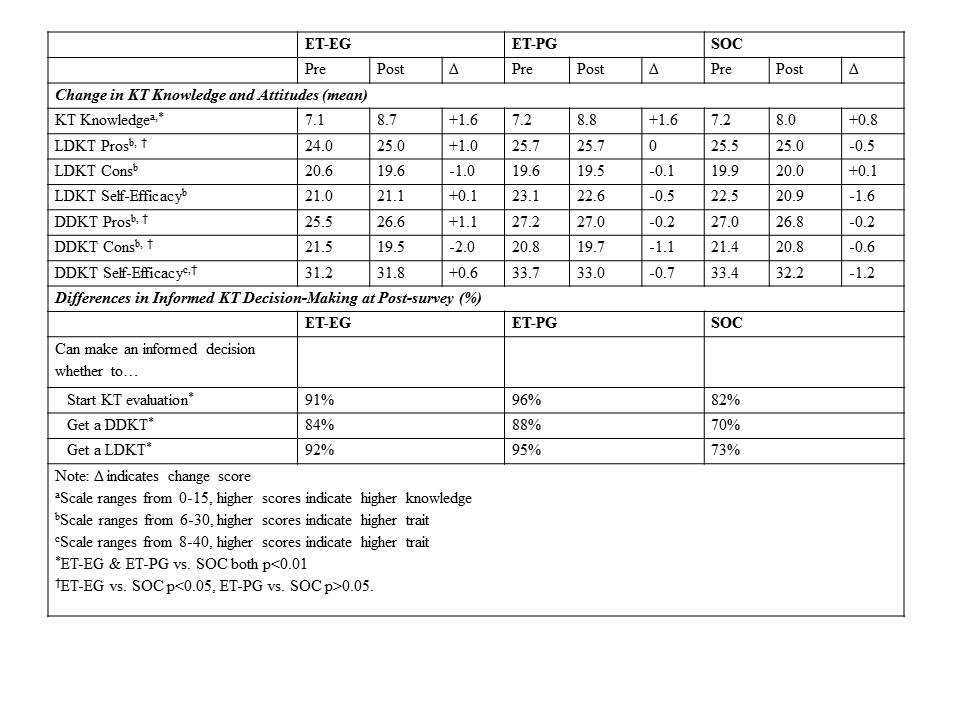At-Home Transplant Education Increases Black and Low-Income Dialysis Patients' Transplant Knowledge, Attitudes, Informed Decision-Making, and Pursuit: An Explore Transplant @ Home Randomized Controlled Trial.
A. Waterman,1 J. Peipert,1 A.-M. McSorley,1 C. Goalby,1 L. Peace.2
1UCLA, Los Angeles, CA
2Missouri Kidney Program, Columbia, MO
Meeting: 2017 American Transplant Congress
Abstract number: 498
Keywords: African-American, Efficacy, Patient education, Psychosocial
Session Information
Session Name: Concurrent Session: Disparities in Kidney Transplantation
Session Type: Concurrent Session
Date: Tuesday, May 2, 2017
Session Time: 4:30pm-6:00pm
 Presentation Time: 5:06pm-5:18pm
Presentation Time: 5:06pm-5:18pm
Location: E451a
Black and low-income dialysis patients, who face greater barriers to kidney transplant (KT), may need additional educational support. This randomized controlled trial (RCT) assessed the efficacy of two supplementary education strategies, in addition to standard of care (SOC) transplant education in dialysis centers: 1) Explore Transplant@Home, a video-based, patient-guided program where educational content is mailed and texted to patients (ET-PG); and 2) ET-PG content plus educator-guided coaching (ET-EG). Over 8 months, patients randomized to ET-PG received 4 videos, 4 brochures, 8 factsheets, and 12 postcards by mail, and up to 80 texts, while patients receiving ET-EG got this content plus 4, 20-minute telephonic coaching sessions. From 2014-2016, we recruited 561 patients, with 369 (72% Black, 28% White) completing assessment and intervention protocols. A per-protocol analysis compared key outcomes for patients who received SOC transplant education (n=160) with patients who reported watching videos/reading brochures in the ET-PG group (n=108), and those who reported watching videos/reading brochures and participating in 4 coaching sessions in the ET-EG group (n=101). Compared to SOC, significant increases in KT knowledge were observed for ET-EG and ET-PG. (Table) Significant increases in living and deceased donor transplant (LDKT and DDKT) pros, DDKT cons, and DDKT self-efficacy were observed for ET-EG compared to SOC. Patients receiving ET-PG took more steps towards KT compared to SOC (rate ratio: 1.36; 95% CI: 1.04-1.76). There were no differences in effects by race. On the post survey, patients receiving ET-EG and ET-PG reported significantly better ability to make informed decisions about transplant compared to SOC. The Explore Transplant@Home program, optimally accompanied by telephonic support from an educator, is efficacious in increasing KT knowledge, pro-KT attitudes, informed KT decision-making, and KT pursuit for patients who are Black and from lower socioeconomic groups.
CITATION INFORMATION: Waterman A, Peipert J, McSorley A.-M, Goalby C, Peace L. At-Home Transplant Education Increases Black and Low-Income Dialysis Patients' Transplant Knowledge, Attitudes, Informed Decision-Making, and Pursuit: An Explore Transplant @ Home Randomized Controlled Trial. Am J Transplant. 2017;17 (suppl 3).
To cite this abstract in AMA style:
Waterman A, Peipert J, McSorley A-M, Goalby C, Peace L. At-Home Transplant Education Increases Black and Low-Income Dialysis Patients' Transplant Knowledge, Attitudes, Informed Decision-Making, and Pursuit: An Explore Transplant @ Home Randomized Controlled Trial. [abstract]. Am J Transplant. 2017; 17 (suppl 3). https://atcmeetingabstracts.com/abstract/at-home-transplant-education-increases-black-and-low-income-dialysis-patients-transplant-knowledge-attitudes-informed-decision-making-and-pursuit-an-explore-transplant-home-randomized-cont/. Accessed February 22, 2026.« Back to 2017 American Transplant Congress
